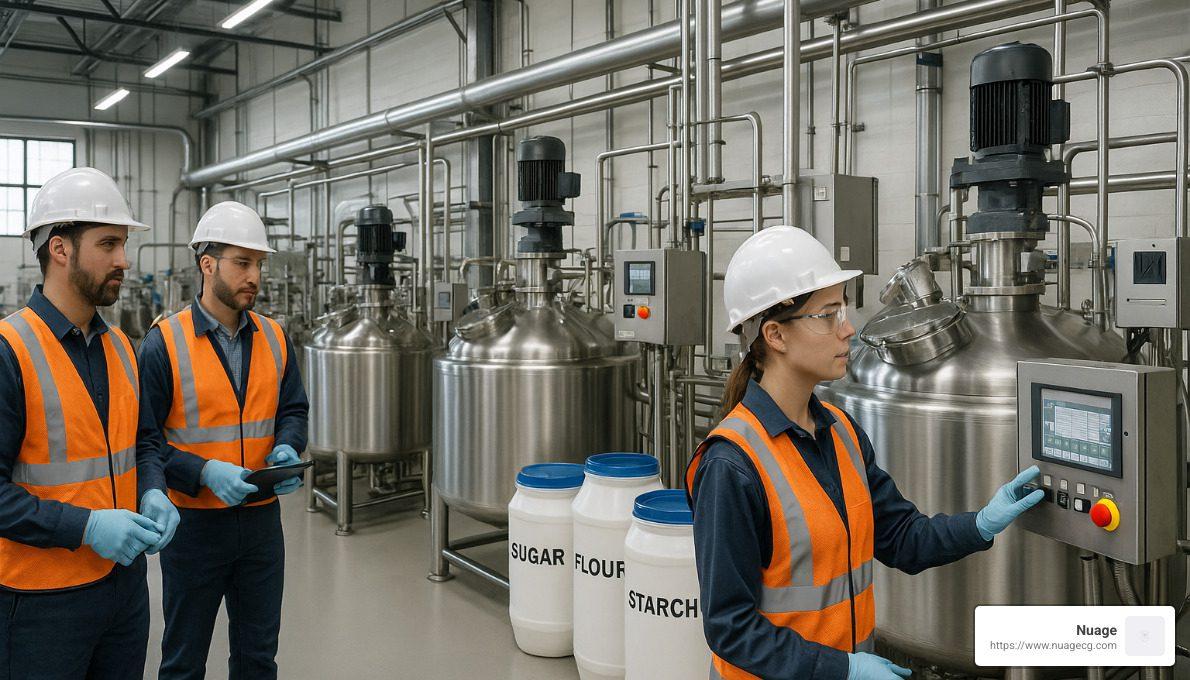Understanding ERP for Batch Manufacturing
When you’re mixing ingredients rather than assembling parts, you need a different kind of ERP system. ERP for batch manufacturing isn’t just a variation of standard manufacturing software—it’s a completely different approach designed for the unique world of formula-based production.
Think about it: in batch manufacturing, once you’ve blended your ingredients together, there’s no going back. You can’t disassemble cake batter back into eggs, flour, and sugar! This fundamental difference is why specialized software is so crucial for batch producers.
I’ve spent over 15 years helping companies implement the right ERP for batch manufacturing solutions, and I’ve seen how transformative the right system can be. I’m Louis Balla, CRO and partner at Nuage, and I’ve guided countless formula-based manufacturers through the journey of selecting and implementing systems like NetSuite.
For manufacturers currently evaluating options, here’s a quick comparison of leading batch manufacturing ERP systems:
| ERP System | Best For | Key Batch Features |
|---|---|---|
| NetSuite | Mid-sized manufacturers | Recipe management, lot tracking, quality control |
| BatchMaster | Process-specific industries | Formula scaling, compliance, by-product handling |
| Deacom | Chemical/Pharma | Regulatory compliance, serialization, QC checkpoints |
| Acumatica | Mixed-mode manufacturers | Cloud-native, multi-modal production, flexible UOM |
The right ERP for batch manufacturing needs to handle several critical functions that standard systems simply weren’t built for. Recipe and formula management with proper version control ensures you’re always working with the current approved formulation. Lot traceability gives you the ability to track every ingredient from receiving dock to customer shipment. Quality control checkpoints throughout production help maintain consistency, while regulatory compliance features keep you on the right side of increasingly complex regulations.
Two particularly important capabilities are batch scaling (automatically adjusting ingredient quantities when production volume changes) and co-product and by-product tracking (managing the additional outputs that often result from batch processes).
As Christina Morrison aptly puts it, “Most ERP systems available today are NOT suitable for Process Manufacturing.” Choosing the wrong system isn’t just inconvenient—it can be like adding “a boat anchor that holds a business back” rather than enabling growth.
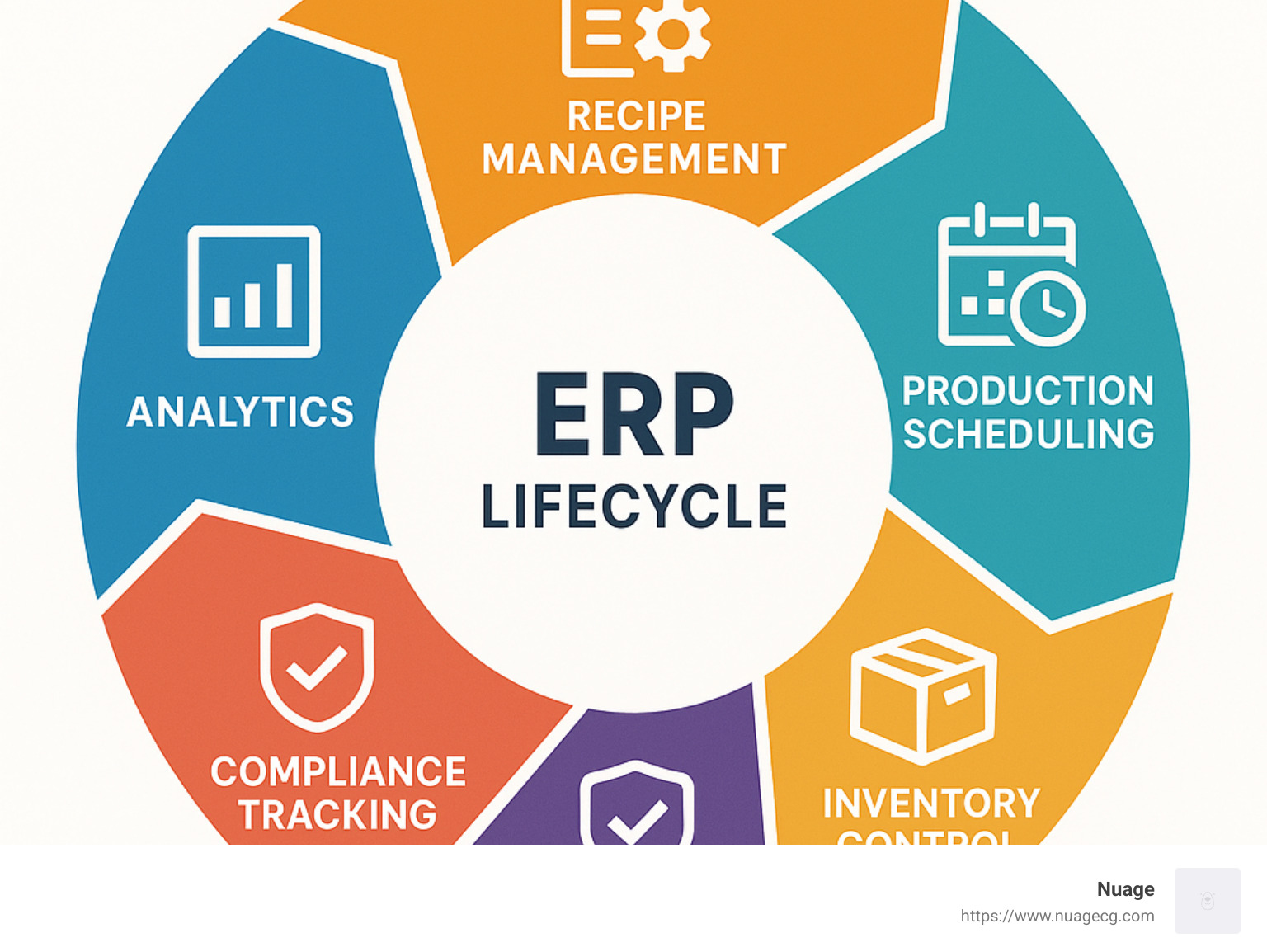
If you’re exploring specialized solutions for your formula-based operation, you might also find value in our resources on ERP for food manufacturing and general ERP systems for manufacturing.
ERP for Batch Manufacturing: Core Requirements & Benefits
When you mix ingredients instead of assembling parts, your manufacturing needs change dramatically. Unlike discrete manufacturing where you can take apart what you’ve built, batch manufacturing combines raw materials in ways that can’t be reversed—once you’ve mixed those cake ingredients, you can’t un-mix them!
This fundamental difference is why specialized ERP for batch manufacturing solutions are essential for formula-based producers who need systems built for their unique world.
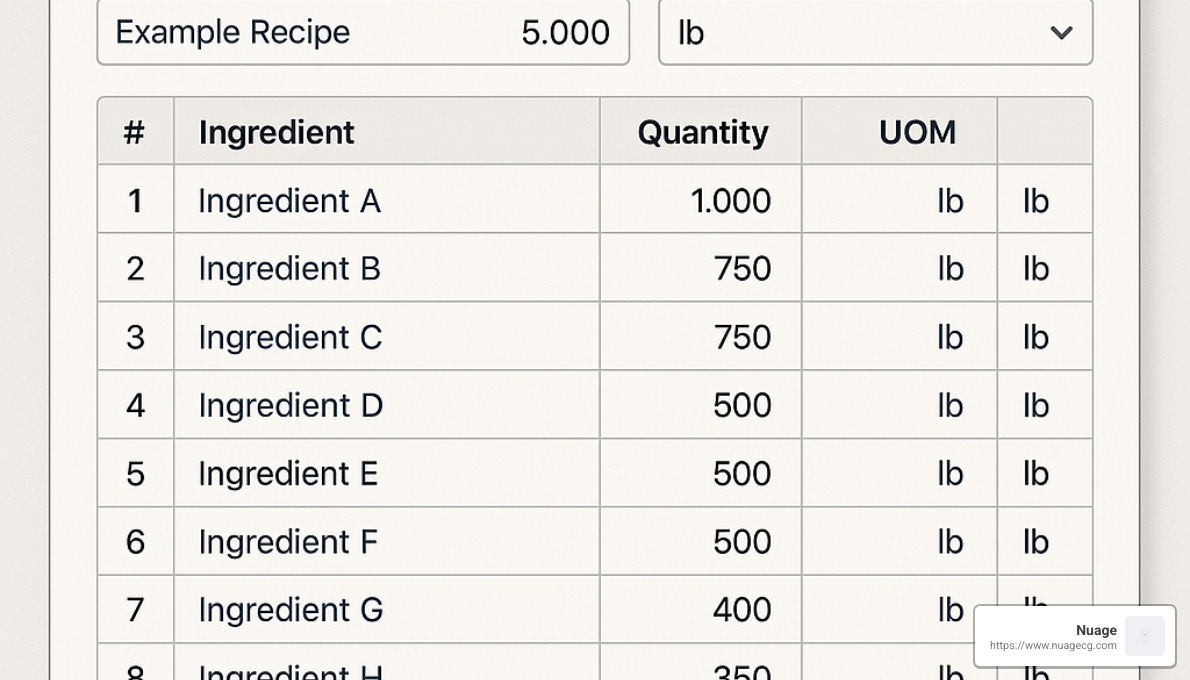
How Batch Differs from Discrete
The batch manufacturing world brings challenges that standard ERP systems simply weren’t designed to handle. Let’s look at what makes batch production so different:
Units of Measure Complexity keeps batch manufacturers on their toes. Imagine tracking orange juice production where you’re buying oranges by the pound, processing juice in gallons, and selling in 12-ounce bottles packed in 24-count cases. Your ERP for batch manufacturing needs to seamlessly convert between these measurements without missing a beat.
Co-Products and By-Products emerge naturally in batch processes. A dairy making cheese also produces whey as a valuable co-product. Oil refineries create multiple products from a single production run. Your ERP must track, cost, and manage all these outputs simultaneously—not just the main product.
Formula/Recipe vs. Bill of Materials represents a fundamental shift in thinking. While discrete manufacturers use fixed BOMs (8 screws + 4 panels = 1 cabinet), batch producers need dynamic recipes that scale, adjust for ingredient potency, and account for substitutions. As one food manufacturer told us, “We don’t just double ingredients to double production—it’s more nuanced than that.”
Variable Yields are a fact of life in batch production. Weather, raw material variations, and even equipment conditions affect how much product you get from your inputs. Your ERP needs to handle these variations both in planning and in cost calculations.
Key Challenges Solved by ERP for Batch Manufacturing
Modern batch manufacturers face intense pressures that the right ERP system can help manage:
Regulatory Pressure never lets up, especially in food, pharmaceuticals, chemicals, and cosmetics. A proper ERP for batch manufacturing automates compliance documentation, maintains audit trails, and generates required reports at the touch of a button. As Justin Dickerson, an ERP Analyst explained: “We are able to upload all our COAs… if we’re audited and someone wants to know what happened in April, we’re able to pull a PDF. The quality department always tells me how much easier it is now.”
Shelf-Life Management becomes critical when your products expire. Your ERP should enforce first-expired, first-out (FEFO) inventory rotation, track remaining shelf life, and alert you before products expire. This prevents waste and ensures customers receive fresh products.
Allergen Control matters tremendously in food and pharma. Your batch ERP system should track allergens through the entire supply chain, schedule production to minimize cross-contamination risk, and ensure proper labeling. One mistake here can lead to recalls, lawsuits, and damaged brand reputation.
Mixed-Mode Production is common in many facilities. You might batch-produce a sauce, then package it on discrete assembly lines. The best ERP for batch manufacturing handles both modes seamlessly within a single platform, eliminating the need for separate systems or awkward workarounds.
Jeff Reingold, COO of Contract Pharmacal Corp, summed it up perfectly: “In past experiences, I have found that many ERP providers require businesses to mold to their software. With 45 years dedicated to strengthening our business processes and perfecting our products, we are excited to have [an ERP that] facilitates our growth strategy rather than hinder it.”
The right batch ERP system doesn’t just track what’s happening—it enables growth, ensures compliance, and helps you make better decisions. For a deeper dive into specific requirements, check out our detailed analysis of ERP for Batch Manufacturing.
NetSuite Advanced Manufacturing: Cloud Native Powerhouse
When it comes to cloud-native ERP for batch manufacturing, NetSuite’s Advanced Manufacturing module truly shines. As the original pioneer in cloud ERP, NetSuite built its platform from the ground up with a single database approach – a refreshing change from the integration headaches many manufacturers face with traditional systems.
This unified approach means your production data, inventory levels, quality metrics, and financial information all live in one place, flowing smoothly between departments. No more reconciling different systems or wondering which version of the truth is correct.
ERP for Batch Manufacturing in NetSuite
For batch manufacturers, NetSuite’s specialized capabilities make daily operations significantly smoother:
The Work Bench Recipe Management feature feels like it was designed by people who actually understand formula-based production. You can define and maintain your recipes with proper version control, scale them automatically based on your batch size, and calculate theoretical yields and costs before you even start production. When raw material prices change, you immediately see the impact on your product costs.
Automatic Backflushing is a game-changer for busy production floors. Rather than manually entering every ingredient consumed, NetSuite automatically deducts materials based on what you actually produced. This not only saves countless hours of data entry but dramatically improves inventory accuracy – giving you real-time visibility into your actual yields versus what your recipe predicted.
The Finite Scheduling capabilities help you steer the complex dance of material availability, equipment capacity, and labor constraints. You’ll see potential bottlenecks before they happen, allowing you to adjust schedules dynamically when the unexpected occurs (and in manufacturing, the unexpected always occurs).
Quality control becomes integrated rather than isolated with NetSuite’s QC Plans. You can define inspection points throughout your production process, record test results directly in the system, and even automatically generate Certificates of Analysis for your customers. Most importantly, NetSuite can enforce quality holds when specifications aren’t met, preventing substandard products from moving forward.
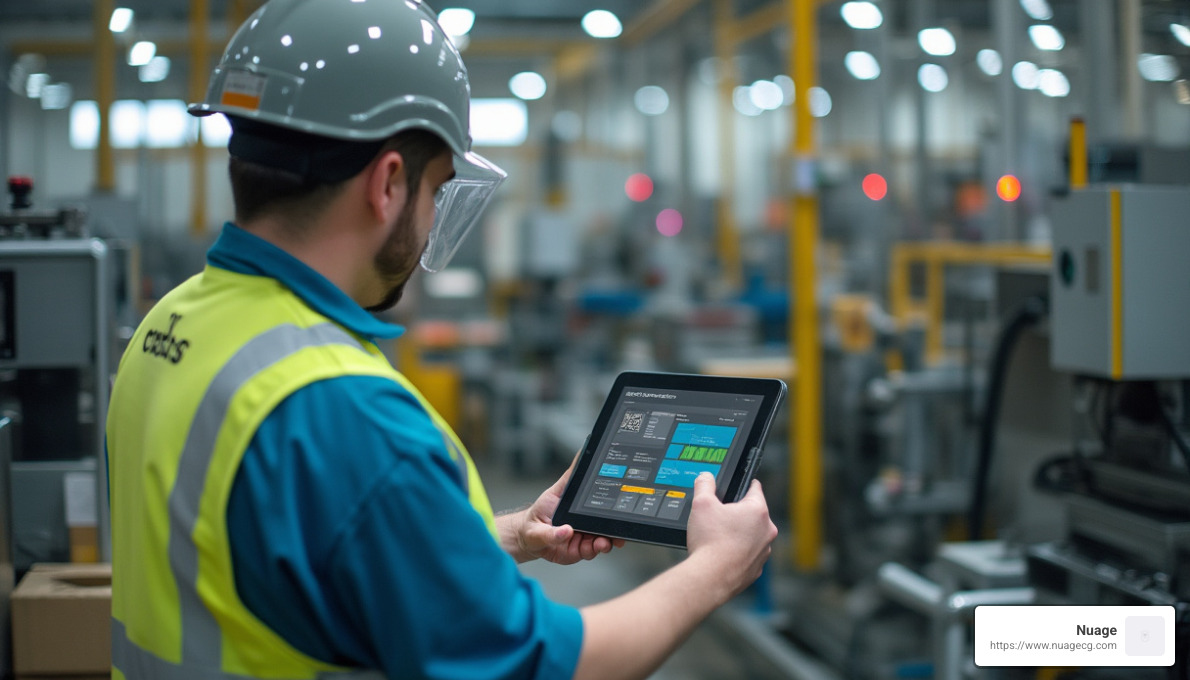
What many batch manufacturers love most is NetSuite’s mobile capability. Production staff can record activities, quality checks, and inventory movements right from the shop floor using tablets or smartphones. As Mr. Satish Mulgi, a Senior IT Manager at a company using a similar solution, puts it: “With [our ERP], we have achieved exactly what we were looking for. It is very easy to use, very intuitive, and can handle virtually everything.”
The system’s MES (Manufacturing Execution System) features integrate seamlessly with barcode scanning, giving you real-time visibility into production status without the paperwork chase.
Stand-Out Advantages
What makes NetSuite particularly attractive for many batch manufacturers is its subscription pricing model. Rather than a massive upfront capital expenditure, you get predictable monthly costs that include upgrades and maintenance. As your business grows, your subscription scales accordingly – no more buying capacity you won’t need for years.
The rapid deployment approach gets you up and running much faster than traditional ERP implementations. With pre-configured templates built around industry best practices, many manufacturers go live in just 3-6 months rather than the year-plus timeframe typical of on-premise systems.
For companies doing business across borders, NetSuite’s global tax and regulatory compliance capabilities are invaluable. The system handles multiple tax regimes, currencies, and languages, with regular updates as regulations change. This means you spend less time wrestling with compliance and more time growing your business.
The seamless e-commerce integration is increasingly important as more batch manufacturers sell direct to consumers or through online channels. Your inventory, orders, and customer information stay synchronized across all sales channels, giving everyone – from production to customer service – a complete picture.
The connection between manufacturing and Industry 4.0 capabilities is becoming increasingly important, and NetSuite’s platform is well-positioned to support this digital change.
At Nuage, we’ve guided numerous batch manufacturers through successful NetSuite implementations. Our approach isn’t about forcing software on you – it’s about understanding your unique processes and configuring NetSuite to support them. Learn more about our NetSuite services and how we can help your batch manufacturing operation thrive in the cloud.
Selecting the Right ERP & Deployment Model
Finding the perfect ERP for batch manufacturing isn’t about choosing the trendiest software – it’s about finding a solution that truly fits your business like a glove. At Nuage, we’ve guided hundreds of manufacturers through this critical decision, always focusing on the right fit rather than pushing a particular product.
Needs Checklist for Batch Manufacturers
Before diving into demos and sales pitches, take time to understand what you truly need. Your production processes matter enormously – are you managing complex co-products or by-products? How intricate are your formulas? Do you need sophisticated yield tracking?
Quality management requirements vary widely across industries. Some manufacturers need automated Certificates of Analysis generation, while others focus on non-conformance handling or specific traceability requirements.
Regulatory compliance is often the make-or-break factor for batch manufacturers. Which regulations govern your products? Do you need electronic signatures for FDA compliance? How would you handle a product recall if it happened tomorrow?
Your inventory management needs are equally important. Many batch manufacturers struggle with lot tracking, shelf-life management, or handling raw material potency variations. And don’t forget about reporting – what KPIs drive your business decisions? Do you need real-time dashboards or specialized compliance reports?
Cloud vs. On-Premise
The cloud vs. on-premise decision dramatically impacts everything from your initial investment to your long-term maintenance strategy.
Cloud solutions like NetSuite offer lower upfront costs, faster implementation, and automatic updates without IT headaches. They’re perfect for companies focused on growth rather than managing servers.
As Mr. Mohammed Kabbashi, an IT Manager who chose a cloud solution, shared: “We took our first step to achieve best-in-class operational efficiency with [our ERP], which eased all our manufacturing as well as logistics complexities.”
On-premise solutions still make sense for some manufacturers, particularly those requiring complete control over their environment or facing unique compliance challenges. They can also prove more cost-effective for very large enterprises over the long term.
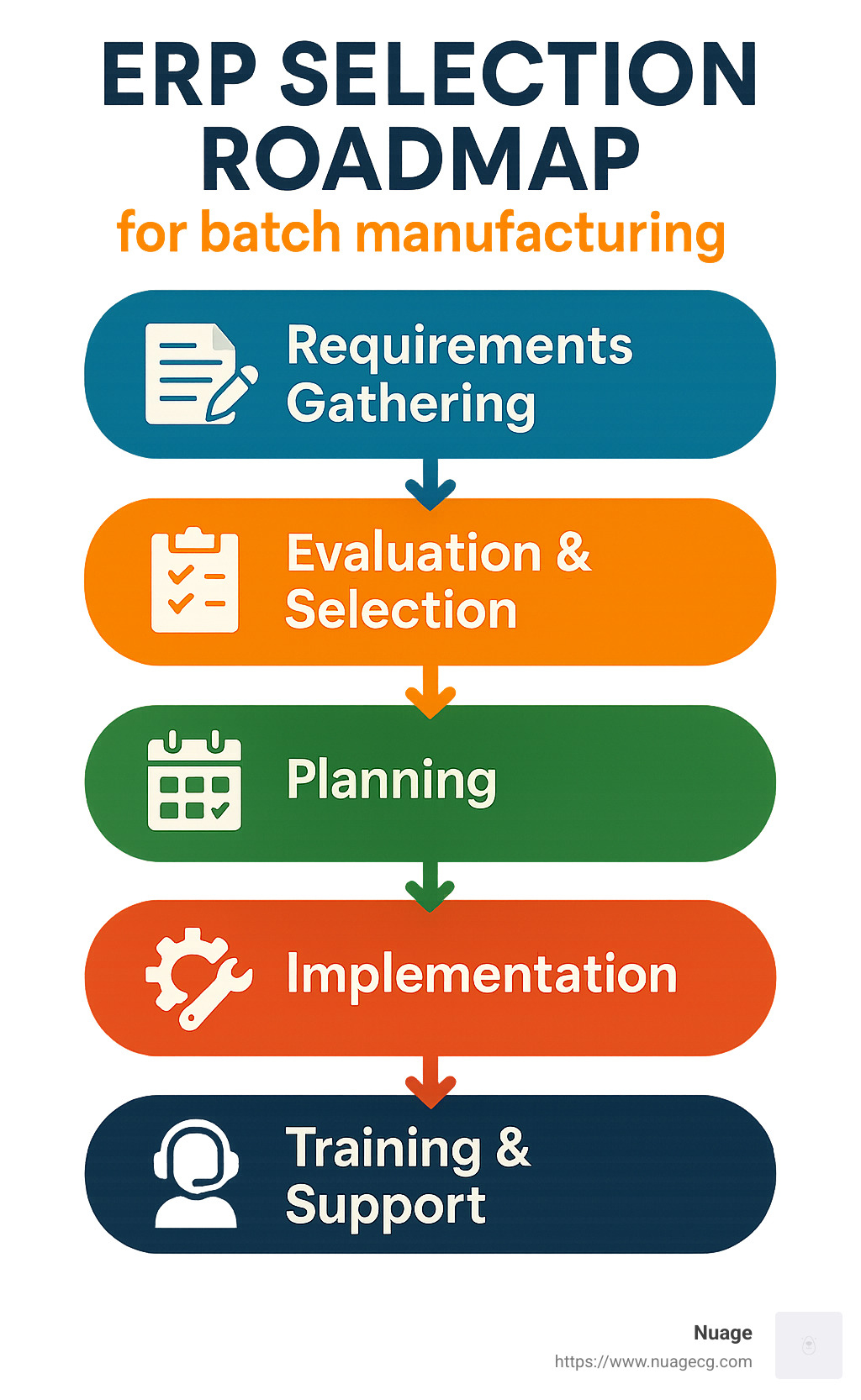
Integration Strategy
Most batch manufacturers don’t start with a blank slate – they have existing systems that need to play nicely with their new ERP. Laboratory Information Management Systems (LIMS) often contain critical quality data. Manufacturing Execution Systems (MES) capture real-time production information. SCADA systems monitor equipment parameters and process controls. And legacy financial systems hold your accounting history.
Creating a thoughtful integration strategy isn’t just a technical exercise – it’s about ensuring information flows seamlessly across your organization. At Nuage, we help manufacturers balance real-time needs with system performance, avoiding the “integrate everything” trap that can lead to maintenance nightmares.
Data Migration
Data migration can make or break your ERP for batch manufacturing implementation. For batch manufacturers, this includes carefully moving master data like item definitions with proper units of measure, formula definitions, and equipment specifications. Transactional data like open orders, current inventory with lot information, and quality specifications need special attention.
The trickiest decisions often involve historical data – how much production history should you bring forward? What about closed orders or completed batches? We help clients balance completeness against practical timeline and budget constraints.
Change Management
The human element determines ERP success more often than the technology itself. Visible executive sponsorship signals to everyone that this project matters. Role-based training ensures everyone learns what they need – not everything at once. Process redesign opportunities let you fix broken workflows rather than digitizing inefficiency.
As one manufacturing client told us, “We thought we were buying software, but we were really changing how we work.” This insight is why our approach at Nuage always addresses the people side of implementation with as much care as the technical side.
For deeper insights on selecting the right manufacturing ERP, our guide on ERP Systems for Manufacturing offers additional perspectives.
Cost Structure & Expected ROI
Understanding the total cost of ownership helps prevent budget surprises. Beyond the obvious license or subscription fees, implementation services typically represent the largest initial investment. This includes requirements analysis, system configuration, data migration, and testing. Don’t underestimate training and change management costs – skimping here often leads to poor adoption.
The ROI comes from multiple sources. Efficiency improvements reduce manual data entry and automate workflows. Inventory optimization lowers carrying costs and reduces waste. Quality improvements decrease rework and customer returns. Compliance benefits streamline audits and documentation.
Mr. Manzoor Quader, Assistant GM Finance at a company that implemented a batch manufacturing ERP, shares his experience: “With [our Enterprise ERP], we have noted increased profitability in our business. We are happy that we opted for it after an intense selection process, as it has checked all the boxes of our requirements.”
Most manufacturers see payback periods of 12-24 months, though this varies based on company size and implementation complexity.
Implementation Best Practices
After guiding manufacturers through ERP implementations for over 20 years, we’ve learned what works. Phased rollouts break the project into manageable chunks, starting with core functionality and adding complexity gradually. User champions from each department become internal experts and change advocates. KPI tracking establishes baseline metrics before implementation and measures progress throughout.
Choosing the right implementation partner makes all the difference. Look for industry experience, cultural fit, and technical expertise in your chosen ERP. Always check references and case studies – past performance predicts future results.
As Mr. Ritesh Patel, MD at a manufacturing company, notes: “We took our first step to achieve best-in-class operational efficiency with [our ERP], which eased all our manufacturing as well as logistics complexities.”
At Nuage, we’re committed to being that trusted partner, bringing both technical expertise and change management skills to ensure your ERP for batch manufacturing implementation succeeds where others might struggle.
Frequently Asked Questions about ERP for Batch Manufacturing
How does an ERP enable end-to-end traceability for recalls?
When it comes to product recalls, speed and accuracy are everything. A robust ERP for batch manufacturing system transforms what used to be a nightmare scenario into a manageable process.
Modern batch ERPs create a digital thread that follows materials from the moment they enter your facility. The system assigns unique lot numbers at receipt, tracks these materials through every production step, links finished goods to their input materials, and connects shipping records to customer orders. This creates a complete chain of custody that works in both directions.
If you find a quality issue, you can trace backward to find the source or forward to identify affected customers. What used to take days of digging through paper records now happens in seconds. One of our food manufacturing clients reduced their mock recall time from 8 hours to just 15 minutes after implementing their new batch ERP.
As Tracy in Quality Assurance at one of our clients put it: “During our last FDA audit, the inspector was impressed by how quickly we could show the complete history of any lot. Our old system would have had us scrambling for days!”
What is the average timeline to implement a batch ERP?
I won’t sugarcoat it – implementing an ERP for batch manufacturing is a significant undertaking. The timeline varies based on your company’s size, complexity, and readiness, but here’s what we typically see:
For mid-sized batch manufacturers, you’re looking at 6-12 months from kickoff to go-live. Cloud solutions like NetSuite often implement faster than on-premise systems thanks to pre-configured templates and simpler infrastructure requirements.
The journey typically includes several phases: findy and planning (1-2 months), design and configuration (2-3 months), data migration and integration (1-3 months), testing and validation (1-2 months), training and preparation (1-2 months), and finally go-live and stabilization (1-2 months).
What often surprises our clients is that technical configuration isn’t the longest part – it’s the human elements of process redesign, change management, and training that require the most time and attention.
As Mike, Operations Director at a chemical manufacturer told us after their implementation: “I wish we’d spent more time preparing our team for the changes. The software was ready before we were!”
Can ERP integrate with existing lab, SCADA or financial software?
Yes! Modern ERP for batch manufacturing systems are designed to play well with others. In fact, one of the greatest values comes from connecting previously siloed systems.
For lab integrations, your quality test results can flow automatically into the ERP, linking specifications to materials and generating Certificates of Analysis without duplicate data entry. One pharmaceutical client eliminated over 20 hours of weekly manual data entry through this integration alone.
SCADA systems can feed real-time production data to your ERP, creating a digital twin of your manufacturing process. This provides insights into equipment performance, triggers alerts based on process parameters, and accurately records consumption and output without operator intervention.
Financial software integration ensures your accounting team has accurate production costs, inventory valuations, and revenue information without reconciliation headaches.
At Nuage, we help clients develop practical integration strategies based on their specific systems and needs. We’ve seen particularly strong results with platforms that offer open APIs, making integration with legacy systems remarkably straightforward.
Rather than attempting everything at once, we typically recommend a phased approach to integration. Start with the connections that deliver the most value, then expand as your team builds confidence with the new system.
As Jennifer, IT Director at a food manufacturer, shared: “The integration between our lab system and ERP eliminated so many arguments between departments. Now everyone works from the same single source of truth.”
Conclusion
Choosing the right ERP for batch manufacturing isn’t just a software decision—it’s a strategic move that touches every corner of your business. Batch production comes with its own special challenges that generic systems simply can’t handle properly.
After helping batch manufacturers transform their operations for over two decades, we’ve witnessed the remarkable difference the right system makes:
- Production teams releasing batches in hours instead of days
- Warehouse managers cutting inventory by 20-30% while actually improving availability
- Quality departments reducing incidents by half or more
- Finance teams closing the books in days rather than weeks
- Companies growing rapidly without the usual staffing increases
At Nuage, we take a different approach than most technology consultants. We don’t start by pushing a particular software solution. Instead, we begin by really listening to understand your unique processes, pain points, and goals.
Our partnerships with leading platforms like NetSuite give us the flexibility to recommend what truly fits your needs, not what fills our quota. This unbiased guidance has earned us the trust of manufacturers across industries.
Whether you’re a food producer juggling allergens and expiration dates, a chemical manufacturer balancing complex formulations with safety requirements, or a pharmaceutical company navigating the strict world of FDA compliance, we’ve walked this path before. Our team brings practical experience that goes beyond theoretical knowledge.
The digital change journey can seem overwhelming, but you don’t have to steer it alone. Our experts are ready to help you find clarity, build a practical roadmap, and implement a solution that works for your real-world challenges.
Ready to explore how the right ERP for batch manufacturing can transform your business? Let’s start with a conversation—no pressure, no obligations. Just practical insights from people who understand your world.
